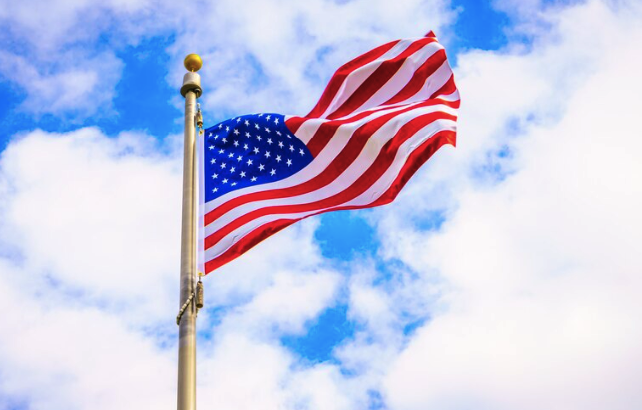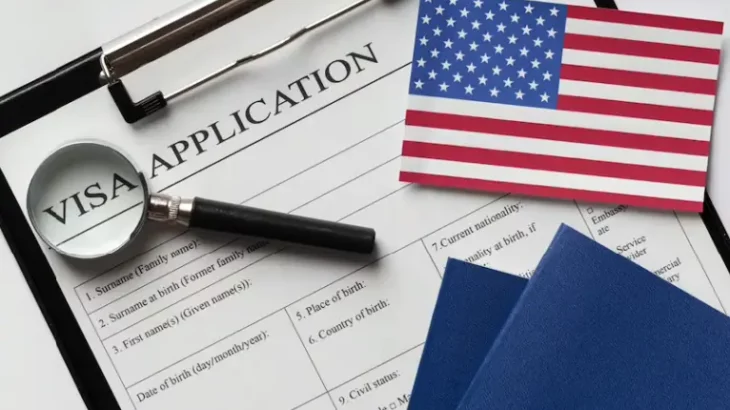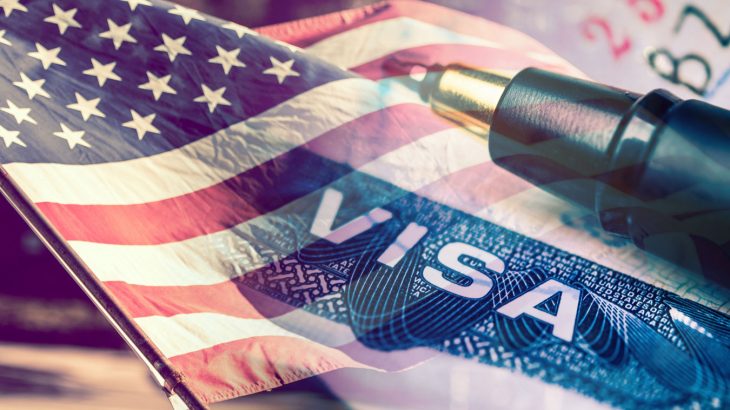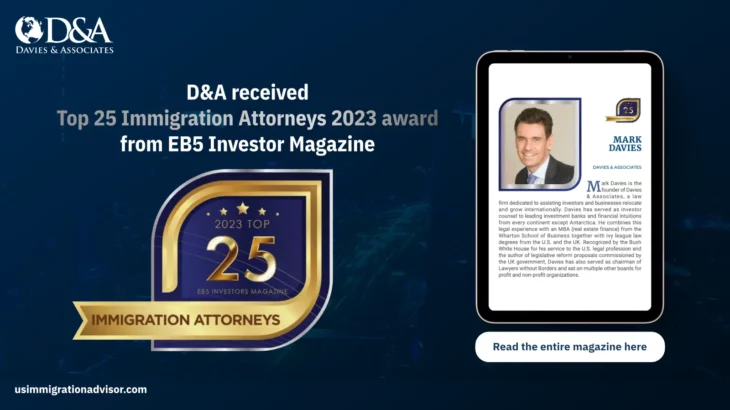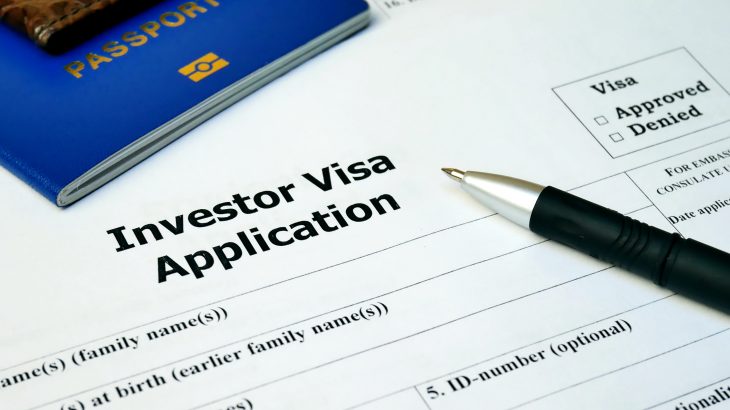Non-immigrant Visa
A non-immigrant visa is for individuals who want to visit, live or work in the United States temporarily. For example, if you’re visiting the U.S. for a vacation or a business conference, then you would need a non-immigrant visa.
On the other hand, an immigrant visa is for individuals who want to permanently move to the U.S. and obtain their green card.
Non-immigrant visa categories include the H-1B, L, J-1 and E-2 and F-1
Process for Temporary Work Visa
There are different federal government agencies involved in reviewing and approving visa applications or petitions for temporary worker visas such as the US Department of Labor, Department of State and the Department of Homeland Security. In some cases, the prospective employer would have to first obtain certification from the DOL and then file a petition with the USCIS (United States Citizenship and Immigration Services) at DHS and after obtaining their approval, the candidate will apply for visa stamping at the US consulate rIn some cases, the prospective employee can apply for a visa directly at the US consulate.
The specific visa category will determine the various steps in the application process.
Types of Temporary Worker Visa
There are different temporary worker visa categories available which you can choose depending on the purpose of your visit and eligibility criteria. We’ve rounded them up below with brief descriptions so you can get acquainted.
CW-1
The CW-1 is a visa exclusively for employers in the Commonwealth of the Northern Mariana Islands (CNMI), where they can apply to employ foreign workers who don’t fit into other employment categories.
E-1
An E-1 Visa is a nonimmigrant classification that allows a national of a treaty country to carry substantial trade and principal trade between the U.S. and their home country. Treaty countries maintain a treaty of commerce and navigation with the U.S., or with which the U.S. maintains a qualifying international agreement, or which has been designated as qualified by law.
E-2
An E-2 Visa is a non-immigrant visa that is granted to a national of a treaty country to make a substantial investment in a U.S. enterprise or business. The definition of a treaty country, in this case, is the same as that of an E-1 Visa.
E-2 CNMI
An E-2C Visa, on the other hand, allows long-term foreign investors to remain in the CNMI through December 31, 2029, while they resolve their immigration status. This visa helps while the CNMI transitions from the CNMI permit system to the U.S. immigration laws.
E-3
An E-3 Visa is a special work visa exclusively given to residents of Australia working in specialty occupations in the U.S. Moreover, their spouse and unmarried children under the age of 21 years may also qualify, even if they are not Australian themselves.
H-1B
An H1-B Visa is reserved for those who will undertake a role with a U.S. employer in a specialty occupation or profession that requires certain minimum education.
H-2A
An H-2A Visa is given to a temporary agricultural worker from certain countries. It’s typically used by foreign agricultural workers who have a job offer from a U.S. company and U.S. companies hiring foreign workers for temporary or seasonal agricultural work.
H-2B
Meanwhile, an H-2B visa is for employers to hire a temporary non-agricultural worker. The employment, in this case, must be temporary as such it’s only for a limited period, seasonal need, or intermittent need.
H-3
An H-3 Visa allows foreign nations to enter the United States either as: 1) a Trainee, to receive training in any field of endeavour other than graduate medical education or training, and 2) a Special Education Exchange Visitor, to participate in a program that provides for practical training and experience in the education of children with special needs.
I
This visa is a type from different non-immigrant visa classifications granted to journalists visiting the United States for work or educational opportunities. It is exclusively for representatives of foreign media across different mediums such as press, film or print.
L
The L Visas is commonly referred to as intra-company transfer visa where an employee of a multinational company is temporarily transferred to a U.S. branch, affiliate, parent or subsidiary of the same company. Under the L1 Transfer Visa, the employee holding a managerial or executive capacity or a specialized knowledge position must also work in a similar capacity in the U.S. office.
O
The O Visa is for individuals with a unique or extraordinary ability in science, arts, education, business, or athletics who wish to temporarily work in their field of expertise in the U.S. Under this visa, the individual must prove that they offer essential services in their field of expertise that can’t be provided by a U.S. citizen.
P-1A
A P-1A Visa is granted to internationally recognized athletes or athletic teams coming to the U.S. to perform at a specific athletic competition. It can be granted to professional or amateur athletes to perform in specific theatrical ice skating productions or tours, either individually or as a part of a group.
P-1B
The P-1V Visa, on the other hand, is given to you if you are coming to the U.S. temporarily as part of an entertainment group that has been established for a minimum of a year and has been recognized internationally as outstanding for a sustained and substantial period.
P-2
The P-2 Visa is a type from the different nonimmigrant visa classifications that is granted if you are coming to the U.S. to perform as an entertainer or artist under a reciprocal exchange program between a U.S. organization and an organization in your home country, either individually or as part of a group.
P-3
The P-3 Visa is a visa classification that’s granted if you’re coming to the U.S. temporarily to perform, teach, or coach as artists or entertainers under a culturally unique program, either individually or as a group.
Q-1
The Q-1 Visa is granted to individuals visiting the U.S. to take part in an international cultural exchange program where they will share their history, culture, and tradition. It is to provide practical training and employment.
R-1
The R-1 Visa is for foreign nationals coming to the U.S. to be employed temporarily as a minister or in another religious occupation for a minimum of 20 hours per week on average.
TN
The TN visa is a visa classification that permits qualified Canadian and Mexican citizens to seek temporary entry into the U.S. to engage at a professional level in business activities.
You can click here to check a summary of these temporary worker visas.
Non-immigrant Work Visa Options
There are three different non-immigrant temporary work visa categories:
- Temporary work visas such as the H-1B, E-2, L-1. Before applying for a majority of these visas, first, there must be an approved petition filed by the prospective employer with the (USCIS.
- Work under an Employment Authorization Document (EAD). This option allows certain eligible non immigrant visa holders including L-2, H-4 (spouses of principal L-1 and H-1B respectively) and individuals awaiting adjudication of their I-485 to apply for the EAD and lawfully work in the US after approval of such application.
- Work in the U.S. with a NAFTA visa. In this category, only citizens of Canada and Mexico are eligible, granting them temporary entry into the U.S. for business at a professional level.
Application for a U.S. Nonimmigrant Visa
Individuals who wish to apply for a visa under the temporary worker categories at the US consulate will first need to fill out a Form DS-160 (Online Non-Immigrant Visa Application). Depending on the requirements of their chosen visa, they might need additional information and forms.
After completing your Form DS-160, you will receive a barcode which you will need to print and keep for your upcoming appointment at the U.S. embassy. You can schedule your visa interview once you already have your barcode.
Immigrant Visas vs Nonimmigrant Visas
A foreign national can enter the United States based on a a valid and unexpired visa, either a nonimmigrant or an immigrant visa.
A nonimmigrant visa is only granted for a limited time, although in most cases, you can extend this visa as long as you meet all the requirements throughout your stay in the U.S.
On the other hand, immigrant visas allow you to live and work in the U.S. permanently and indefinitely. However, take note that immigrant visas don’t grant you the same rights as that of a U.S. citizen.
If you’re unsure of which visa category applies to your goals and circumstances, the experienced team of lawyers at Davies & Associates can help you navigate, strategize and determine which visa best fits your needs
Looking for an US immigration lawyer? Request free consultation at Davies & Associates or find our closest location around the world.

























